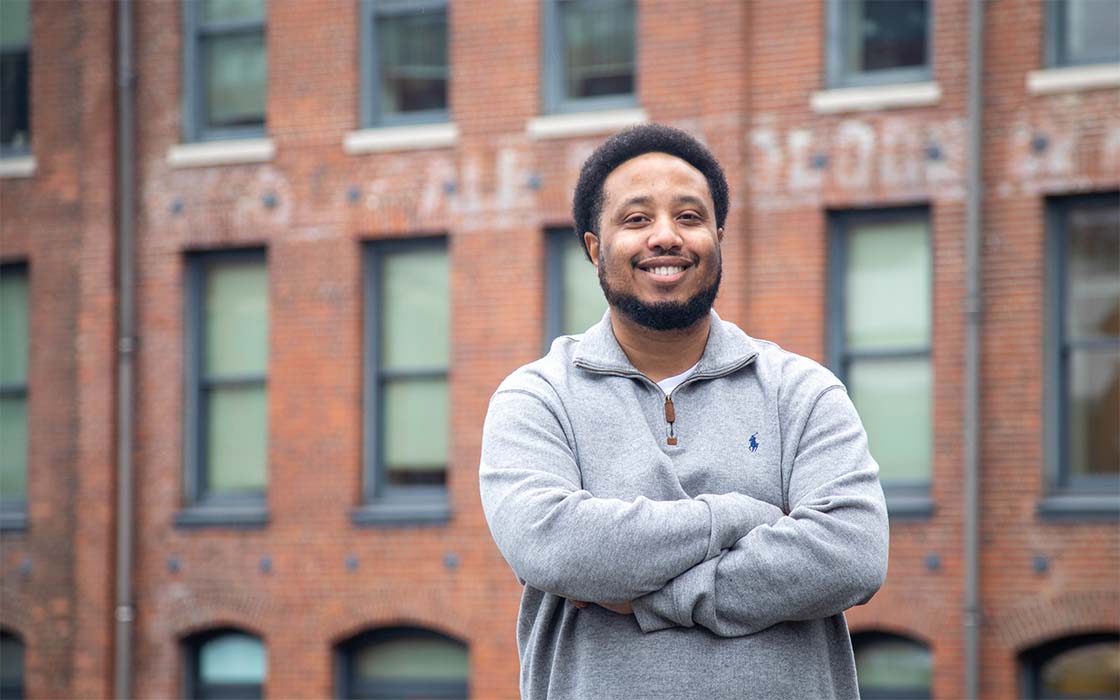
Omari Amili: Navigating the Post-Prison Pathway
This Section's arrow_downward Theme Info Is:
- Background Image: ""
- Theme: "light-theme"
- Header Style: "purple_dominant"
- Card Height Setting: "consistent_row_height"
- Section Parallax: "0"
- Section Parallax Height: ""
It’s hard to imagine anyone more suited to the Husky Post Prison Pathways director position than Omari Amili, ’14, ‘16. He is a consultant, speaker and author. His undergraduate and graduate degrees, academic research and work experience have all focused on navigating post-incarceration life. He has also successfully made the journey himself.
“It’s the exact work that I’ve been involved with,” said Amili, “making sure that people released from prison can find opportunity and resources and never have to return.” In 2008, he made and kept that same promise to himself.
Navigating Through Oppression
Because of systemic racism and inequities, Amili struggled growing up. “I dealt with poverty and homelessness and dropped out of high school,” he said. At 16, he was, as he described in a 2020 University of Washington Magazine interview, “enticed by the idea of a life of luxury and began my involvement in bank fraud. I got money, fancy cars, and up until the age of 21, a taste of life I never thought was possible while growing up in crack houses, foster homes and homeless shelters throughout the Pacific Northwest.”
“I ended up being incarcerated for nearly two years,” said Amili. Along the way, he learned that a prison record meant your life was over. “You may walk out with the best intentions to never go back,” he says. “But when you are met by a community that won’t give you a place to live or a job, prison becomes a revolving door. I chose not to accept that truth.”
Finding a path wasn’t easy. Even as Amili earned his degrees and passed each milestone, he thought he might be the only person ever to do it. What made the difference for him? In addition to his vision, hard work and determination, he found a couple of open doors. “First, Pierce College and then UW Tacoma had places for me,” he said. He earned an A.A. from Pierce College in 2011. From UW Tacoma, he received two B.A. degrees in 2014 — one in psychology, the other in interdisciplinary arts and sciences. He topped those off with a UW Tacoma master of arts in interdisciplinary studies in 2016.
It is due to the exceptional impact he has on students, formerly incarcerated individuals and the broader community that an appreciative colleague nominated Amili to receive the 2023-24 UW Tacoma Distinguished Alumni Award. The UW Tacoma Alumni Council and Chancellor Sheila Edwards Lange endorsed the nomination. Previously, Pierce College recognized Amili with its 2018 Distinguished Alumni Award.
Amili knows of many people on similar journeys to safety and success. “I’m not some exceptional individual,” he said. “A lot of people in prison have the potential to do the same thing.”
A Wide and Welcoming Path
It’s Amili’s job to make the journey to safety and success easier. “Our main focus is recruitment, retention and social mobility,” he said. “Once they are here, we want to help them navigate enrollment, financial aid, and connecting their education to a future career.”
Knowing the many barriers that any student might face while navigating college, from illness to balancing school and work, Amili’s vision includes tapping into existing support networks and finding opportunities to make warm hand-offs.
“People formerly incarcerated often have a lot of different intersecting identities, such as being a first-generation college student or a former foster youth,” he said. “There’s natural room for collaboration with campus departments supporting these identities; the same is true with off-campus partners. It can’t be one group that does it all. There must be relationships and referral processes.”
Amili is also looking forward to students taking initiative. “We want to create leaders,” he said. “We want peer navigators and mentors who can share their experiences and resources.”
In addition, things like second-chance employers at career fairs on and off campus create a safe space for exploration. “It lets people know that they won’t have a door slammed in their face,” said Amili. “It also seeks to address underemployment, where people settle for entry-level or minimum-wage jobs rather than landing a meaningful career.”
In addition to sharing his passion for his own meaningful career, Amili reflected on how it feels to receive the 2024 UW Tacoma Distinguished Alumni Award. “As an adjunct instructor in the School of Social Work and Criminal Justice, who has served on many committees and led events, you never know who is paying attention,” he says. “There are so many alumni they could have chosen, and the fact that UW Tacoma embraces someone who holds my background means a lot to me — it’s hard to put into words.”
That’s because there aren’t many places embracing formerly incarcerated individuals where they can feel safe. Because of that, while Amili is relishing opportunities to shine a light on the program, he knows that putting students in the spotlight can cause great harm. “There are pros and cons to formerly incarcerated people being out there,” he says. “Our priority is creating a safe, student-led space for this marginalized identity.”
He also emphasizes that this is not about lowering the bar or catering to special needs. “It’s about navigating systems that weren’t designed for me, systems designed for exclusion,” he says. “While not every university campus is welcoming, we want you to know you belong here. We will support you to reach your goals.”
Recent news
Main Content
Gathering Strength
News Tags on this arrow_upward Story:
- None
Main Content
UW Tacoma Enrollment up 4% for Autumn 2024
News Tags on this arrow_upward Story:
- None
Main Content
Celebrating First Gen
News Tags on this arrow_upward Story:
- None



